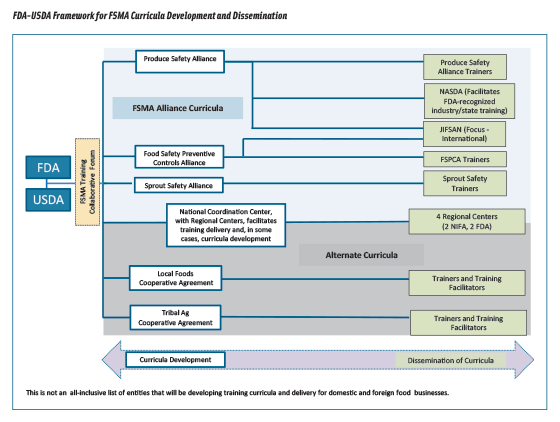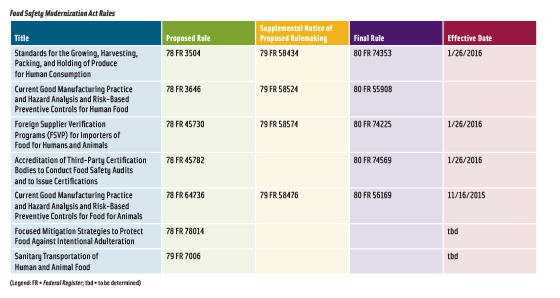Modernizing Food Safety
FOOD SAFETY & QUALITY
 The Food Safety Modernization Act (FSMA), signed into law on January 4, 2011, was designed to ensure that the United States food supply is safe by shifting the focus from responding to contamination to preventing it. The FSMA requires the U.S. Food and Drug Administration (FDA) to issue seven foundational regulations. To date, the FDA has issued final regulations on produce safety; foreign supplier verification programs; accredited third-party certification; preventive controls for human food; and preventive controls for animal food, including pet food. The agency has also proposed rules on protecting food against intentional adulteration and on sanitary transportation of food. This article focuses on sources of information and assistance for the food and agriculture industries in complying with the regulations.
The Food Safety Modernization Act (FSMA), signed into law on January 4, 2011, was designed to ensure that the United States food supply is safe by shifting the focus from responding to contamination to preventing it. The FSMA requires the U.S. Food and Drug Administration (FDA) to issue seven foundational regulations. To date, the FDA has issued final regulations on produce safety; foreign supplier verification programs; accredited third-party certification; preventive controls for human food; and preventive controls for animal food, including pet food. The agency has also proposed rules on protecting food against intentional adulteration and on sanitary transportation of food. This article focuses on sources of information and assistance for the food and agriculture industries in complying with the regulations.
Alliance Activities
While the food industry is ultimately responsible for getting the training needed to comply with the FSMA rules, the FDA recognizes the importance of its role in facilitating that training and has collaborated with industry, academia, and state, federal, tribal, and international governments in the development and delivery of training. The agency began helping create public-private alliances funded primarily by the FDA as a resource for industry.
As a result, the Produce Safety Alliance, Food Safety Preventive Controls Alliance, and Sprout Safety Alliance have been developing training programs and curricula to help domestic and foreign food businesses, including small and very small farms and facilities, understand the requirements of the FSMA rules. Composed of representatives from the FDA, the U.S. Department of Agriculture (USDA), state regulatory agencies, the food industry, and academia, the alliances are developing model, standardized curricula. The FDA also plans to fund the development of alternate training programs for local food producers, including sustainable and organic farms and tribes, through cooperative agreements. The agency intends that the standardized curricula being developed by the alliances and alternate curricula developed through cooperative agreements are the only ones that it will officially recognize. The FDA encourages companies or organizations that are developing other training courses to work with the alliances and the National Coordination Center and its regional centers to ensure consistency and completeness of training. The agency also plans to provide additional information regarding how such programs will be evaluated.
• The Produce Safety Alliance (PSA) was established in 2010 at Cornell University through funding from the FDA and the USDA to provide fresh fruit and vegetable growers, regulatory personnel, and others with training and educational opportunities to ensure the safety of fresh produce and to meet the regulatory requirements of the FSMA produce safety rule. The alliance has developed a standardized, multi-format training curriculum that covers basic good agricultural practices (GAPs), co-management, and information intended to increase produce safety knowledge and outline how to implement the regulatory requirements.
The PSA will also offer a two-day train-the-trainer course to develop a network of qualified trainers to train produce growers to meet the regulatory requirements of the produce safety rule. Individuals interested in becoming a PSA trainer to train growers using the PSA curriculum should have a basic understanding of microbiology as it relates to produce safety and the pathogens most often associated with produce outbreaks; an understanding of how fruits and vegetables are grown, harvested, packed, and transported; and knowledge of the produce safety rule. They must also have experience in training adult learners and/or extension experience in food safety or produce production. Individuals wanting to become a PSA lead trainer must attend the train-the-trainer course and successfully complete an interview to demonstrate their competency in the aforementioned areas. In addition to providing a foundation on GAPs, the produce safety rule standards, and principles of adult education, the train-the-trainer course will cover how to incorporate the PSA curriculum into other extension trainings, develop working partnerships, and register a PSA grower training course with the Association of Food and Drug Officials.
 PSA director Elizabeth A. Bihn said that the alliance is reviewing the final produce safety rule and incorporating any changes into the curriculum materials. The alliance plans to launch training programs across the United States in early 2016. PSA personnel are also working with other groups offering international training programs to ensure that PSA training materials are available to those that may benefit from them.
PSA director Elizabeth A. Bihn said that the alliance is reviewing the final produce safety rule and incorporating any changes into the curriculum materials. The alliance plans to launch training programs across the United States in early 2016. PSA personnel are also working with other groups offering international training programs to ensure that PSA training materials are available to those that may benefit from them.
• The Food Safety Preventive Controls Alliance (FSPCA) was created in 2011 by a grant from the FDA to the Institute for Food Safety and Health (IFSH), a nationally recognized leader in food safety, to develop a standardized training and education program to help industry comply with the preventive controls rules for human and animal foods. The FDA has also asked the alliance to develop training on the Foreign Supplier Verification Program (FSVP). The training program includes two separate standardized hazard analysis and preventive controls training courses and distance-education modules, one for the human food industry and regulatory personnel and another for the animal food industry and regulatory personnel. The curriculum addresses steps in developing a food safety plan, types of hazards, conducting a hazard analysis, preventive controls for hazards, monitoring preventive controls, verification and validation, corrective actions/corrections, recordkeeping, and regulatory requirements.
In addition, the alliance is developing a course module on the FSVP rule for processors who import foods and a full FSVP course for non-processor importers and is encouraging all importers to take the complete preventive controls training once offered. The alliance hosts quarterly webinars to update stakeholders on the progress of the alliance; they are available on the alliance’s website. The alliance also conducts courses combining the preventive controls for human food course and the FSPCA lead instructor training course. Dawn Johnson, alliance administrator, said that additional lead instructor and participant courses are being planned throughout 2016 and beyond.
--- PAGE BREAK ---
• The Sprout Safety Alliance (SSA) was created by the FDA in cooperation with the IFSH in 2012 to help sprout producers understand and comply with elements of the FSMA that apply to sprouts. SSA serves as a network hub and resource for the sprout industry and federal and state regulatory agencies. It provides information to enhance the safe production of sprouts, which have been frequently associated with foodborne illness outbreaks. The alliance is developing training programs to help sprout growers understand and meet the requirements of the FSMA regulations and best practices. It is developing a course to train people interested in helping to train growers about safe sprout production. Kaiping Deng, research assistant professor at IFSH and coordinator of the alliance, said that four pilot sessions of the train-the-trainer course have been held in the past three years to collect feedback on the SSA curriculum from sprout growers and regulators as well as a recent focus group meeting to allow Chicago-area sprout growers and federal and state regulators to comment on the SSA training materials and training methods. After the curriculum is reviewed and revised by regulators in the FDA’s Produce Safety Division, the SSA will launch its training program with train-the-trainer courses in spring 2016.
The alliance is developing training programs to help sprout growers understand and meet the requirements of the FSMA regulations and best practices. It is developing a course to train people interested in helping to train growers about safe sprout production. Kaiping Deng, research assistant professor at IFSH and coordinator of the alliance, said that four pilot sessions of the train-the-trainer course have been held in the past three years to collect feedback on the SSA curriculum from sprout growers and regulators as well as a recent focus group meeting to allow Chicago-area sprout growers and federal and state regulators to comment on the SSA training materials and training methods. After the curriculum is reviewed and revised by regulators in the FDA’s Produce Safety Division, the SSA will launch its training program with train-the-trainer courses in spring 2016.
FDA Activities
The FDA has also been working with other organizations and providing information on the FSMA rules. It has partnered with the USDA’s National Institute of Food and Agriculture to establish a competitive grant program to fund a National Coordination Center (NCC) and four regional centers to provide training opportunities for owners and operators of farms, small food processors, and small fruit and vegetable merchant wholesalers. A grant of up to $600,000 over three years was awarded to the International Food Protection Training Institute to establish the NCC, which will coordinate and support the delivery of standardized and alternate training curricula through the regional centers. The regional centers will communicate the training opportunities available to target businesses in their region, deliver training opportunities, and identify any need to develop or tailor curricula to meet specific needs or target a specific audience. The regional centers will be established with separate grant money in four regions of the country. In July 2015 the FDA issued a request for applications to establish the north central and northeast centers, and in October 2015 the USDA awarded more than $2 million in grants to the University of Florida and Oregon State University to establish the southern and western centers, respectively.
The FDA is developing guidance documents for foreign suppliers, including a general guidance document on the foreign supplier verification program and how to obtain the necessary expertise to be a qualified auditor. The agency is also collaborating with the food industry, academia, the USDA, the United States Agency for International Development, and foreign governments to develop the tools and training programs needed to facilitate compliance by exporters, including those from developing countries. It has also set up an FSMA Food Safety Technical Assistance Network as a central source of information about FSMA implementation, including FSMA rule interpretation.
The FDA has entered into a five-year cooperative agreement with the National Association of State Departments of Agriculture (NASDA) to collaboratively plan implementation of the produce safety rule. NASDA will help facilitate industry training and play a role in training state regulators. It is also working with other state regulatory stakeholder groups, including the Association of Food and Drug Officials, the Association of Public Health Laboratories, the Association of American Feed Control Officials, and the Association of State and Territorial Health Officials, which participate in the alliances and will help facilitate training of industry and state regulators.
The FDA is working with the Joint Institute for Food Safety and Applied Nutrition, a partnership between the FDA and the University of Maryland, to increase global knowledge of effective food safety practices. The agency intends to establish a quarterly informal FSMA Collaborative Training Forum, co-chaired by the FDA and the USDA, to provide an opportunity for dialogue among the agencies, centers, associations, and others involved in this training. And it has been hosting a series of webinars on the FSMA rules, with the most recent presented in December 2015.
Activities of Other Groups
A number of other organizations and companies serving the food and agriculture industries have also been active in providing information regarding compliance with the FSMA rules. Here are a few examples:
• The Institute of Food Technologists presented eight webinars on the FSMA over the past three years, all available via the IFT online webinar catalog. A webinar on accreditation of third-party auditors is scheduled for early 2016, and another on focused mitigation strategies to protect food against intentional adulteration will take place early this summer.
• SGS Food Safety Services issued a white paper discussing how companies can integrate FSMA requirements into their food safety management systems and offers a U.S. food safety management assessment program with a single audit to show compliance with the FSMA, FDA, and USDA requirements.
• EAS Consulting Group offers an FSMA readiness assessment to help companies develop a cohesive implementation plan.
• Eurofins Food Safety Systems has presented webinars on the FSMA rules, held an FSMA forum with experts from industry and academia and consumers, and will offer the FSPCA preventive controls course May 17–19, 2016, in Des Moines, Iowa.
 Neil H. Mermelstein, IFT Fellow, Editor Emeritus of Food Technology
Neil H. Mermelstein, IFT Fellow, Editor Emeritus of Food Technology
[email protected]


